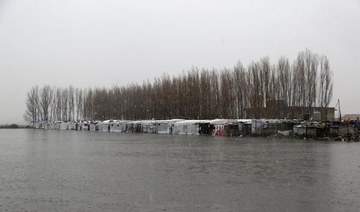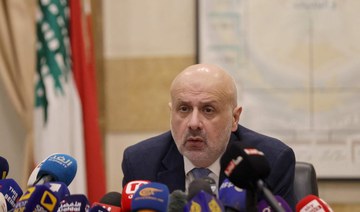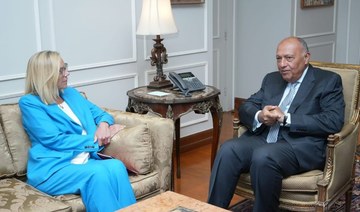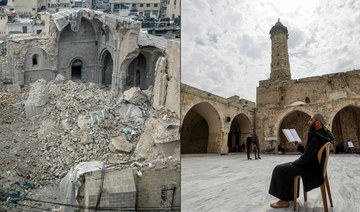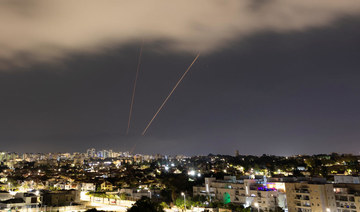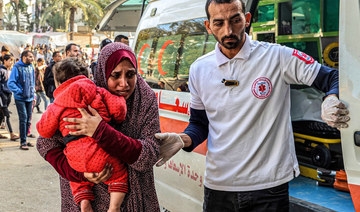BEIRUT: Lebanese mobs attacked buses and cars carrying Syrians expatriates and those who fled the war heading to the Syrian embassy in Beirut on Thursday, protesting against what they said was an organized vote for President Bashar Assad.
Assad is running for a fourth seven-year term— facing symbolic competition from two candidates— in a vote all but guaranteed to bring him back as president.
The in-country vote is expected next week, while Syrians abroad are casting their votes Thursday. The election is the second since the country’s civil war broke out 10 years ago and is seen by the opposition as well as Western and some Arab countries as a sham designed to give the incumbent a new mandate with a veneer of legitimacy.
Scattered mobs of anti-Syrian Lebanese, most of them from the Christian rightwing Forces group, waited for convoys of cars and buses carrying Syrian voters at intersections in Beirut, outside the capital and in the eastern Bekaa region. They pelted them with rocks and smashed windows with sticks. In one incident near Nahr el-Kalb on the highway north or Beirut, one attacker poked a wooden stick inside the car, poking the driver as others smashed the windshield.
Buses carrying hundreds of voters featured pictures of the incumbent president on the windows.
“They don’t need to carry pictures and flags for an absurd criminal regime,” said Fadi Nader, one of the protesters. “If they want to vote, they can go home and vote there... Since they love Bashar Assad, why don’t they go home?“
Samir Geagea, the head of the Lebanese Forces group, said Wednesday that the thousands of Syrians who are voting for Bashar Assad are clearly not fearful of his government and don’t seem to be refugees afraid of returning home. He called on the government and president to arrange for their return to Syria.
Lebanese army soldiers stood guard as Syrian citizens who live in Lebanon queued outside their embassy in Yarze, east of Beirut, to cast their ballots. Some shouted slogans in support of Assad as they waited.
Lebanon is home to over 1 million Syrians, making it the country in the region hosting the largest number of refugees per capita. Their presence — nearly one Syrian for every four Lebanese — has weighed heavily on Lebanon’s infrastructure, and resources, particularly as the small country reels under an unparalleled economic crisis.
But calls for the return of Syrians home have also been a widely politicized issue among Lebanese who have been deeply divided over the 10-year Syrian conflict, with some supporting Assad and others backing his opposition.
Even before the conflict, Syria’s role in Lebanon was deeply divisive. Syrian troops were deployed in Lebanon in 1976 shortly after the civil war broke out here to keep the peace. They only pulled out in 2005 following a UN resolution, after a 29-year domination of Lebanese politics.
The Syrians living in Lebanon find themselves in a hard spot.
The United Nations agency for Refugees, UNHCR, said it has received reports from registered Syrian refugees that they were pressured before the elections to cast their vote— including threats of physical harm or confiscation of documents. It was not immediately clear who was behind the threats. The agency’s spokesperson Lisa Abou Khaled said they are following with relevant stakeholders to ensure the refugees are free to vote.
Assad has been in power since 2000 when he took over from his father, Hafez, who ruled before that for 30 years. Despite the war, which seemed at one point to threaten his rule, Assad remained in power, supported by regional powerhouse Iran and Russia.
The armed conflict has subsided in recent years, but Syria remains torn. Thousands of foreign troops are based in different parts of the country. The elections are not taking place in at least four provinces because they are under the control of the opposition and Kurdish forces, depriving nearly 8 million Syrians of a vote.
The Biden administration has said it will not recognize the result of Syria’s presidential election.
Syria has been in the throes of civil war since 2011, when Arab Spring-inspired protests against the Assad family rule turned into an armed insurgence in response to a brutal military crackdown. Around half a million people have been killed and half the country’s population displaced.
Mobs attack Syrians heading for presidential vote in Lebanon
https://arab.news/2t2hj
Mobs attack Syrians heading for presidential vote in Lebanon
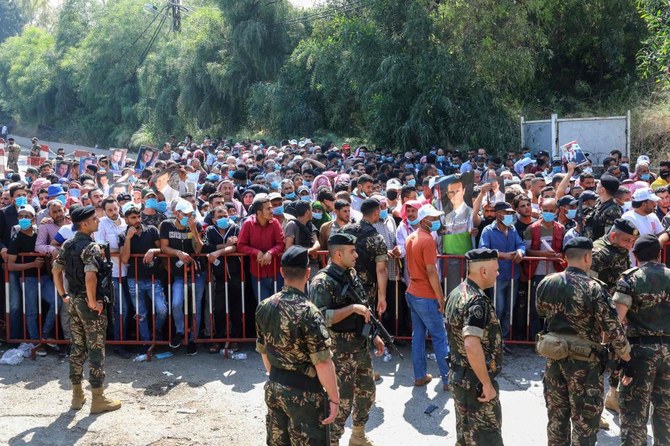
- The in-country vote is expected next week, while Syrians abroad are casting their votes Thursday
Crimes by Syrians in Lebanon prompts reassessment of early repatriations
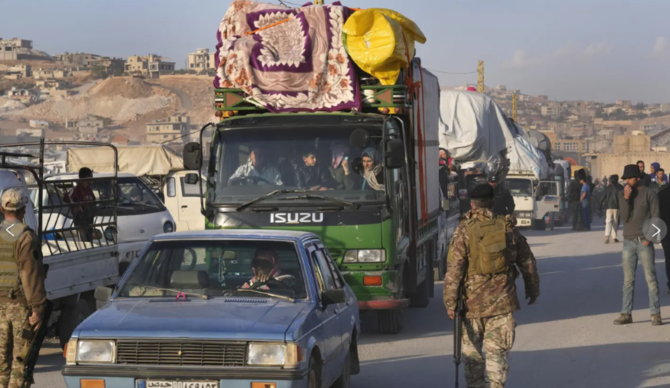
- Latest incident was the killing of an official in the Lebanese Forces Party, Pascal Suleiman
- Lebanon currently hosts around 2 million Syrians, most having arrived since 2011
BEIRUT: The UN High Commissioner for Refugees reiterated on Tuesday “the right of Syrian refugees in Lebanon to return freely to their homeland whenever they choose to do so.”
It came as the campaign against the continued presence of Syrian refugees in Lebanon intensified against the backdrop of crimes committed by Syrians in recent weeks.
The latest incident was the killing of an official in the Lebanese Forces Party, Pascal Suleiman, last week after his car was stolen and his body taken to the Lebanese-Syrian border.
It was preceded a few days earlier by another crime committed in the Achrafieh area in Beirut against a husband and wife by their Syrian maid and other Syrians in and intended robbery. The husband died following the incident and his wife seriously injured.
On Tuesday morning news broke of the death of Lebanese Yasser Al-Kokash in the town of Al-Azzounieh in Aley district at the hands of Syrian citizens after they tied him up and stole the contents of his apartment.
Syrian refugees started coming to Lebanon in 2011. The number of refugees registered with the UNHCR has decreased to less than one million people after some returned to their country. However, after the UNHCR stopped registering Syrian refugees in 2015, the rate of illegal crossings from Syria to Lebanon increased.
Lebanon estimates the number of Syrian refugees on its territory to exceed 2 million people.
Caretaker Minister of Interior Bassam Mawlawi estimated the percentage of Syrian detainees and convicts in Lebanese prisons to be about 35 percent of the total prison population.
The Lebanese General Security has organized voluntary repatriation trips for Syrian refugees, but only a few thousand refugees returned, as the Syrian regime decides who can return according to lists of names provided by the Lebanese General Security to the relevant Syrian authorities.
In a statement, UNHCR spokeswoman Dalal Harb said: “We support and respect the humanitarian right of refugees to return freely and voluntarily to their home country, whenever they choose to do so, in accordance with international principles and non-refoulement.”
Harb stressed that “most Syrian refugees express their desire to return to Syria, but their decision is based on several factors, including safety, security, housing, access to basic services, and securing livelihoods.”
He added the UNHCR “will continue to cooperate with the General Directorate of General Security, which facilitates the repatriation of the refugees who want to return to Syria by registering their names.”
Ahead of the Brussels Conference on Refugees on April 30, Lebanon has urged donors to secure assistance to cover the cost of the Syrian presence in the country.
Minister of Information Ziad Makary said on Tuesday: “The illegal infiltration of Syrian refugees through the sea from Lebanon into Cyprus has caused a diplomatic crisis.
“The crimes that have occurred made us focus more on this existential problem for Lebanon. The solution is for them to either return to Syria or go to a third country.”
Makary also went over the decisions taken, such as “the circular aiming to close all the unauthorized institutions owned by Syrians.”
He considered that “convoys of return require a political solution with Syria.”
A plan proposed by the ministers of labor and social affairs, the Maronite League, and the General Directorate of General Security was also addressed, which aims to repatriate Syrians, calls for the establishment of a National Emergency Authority headed by the prime minister.
It will be in charge of communicating with UNHCR officials in order to assist the state in classifying Syrians into three categories.
The first includes Syrians registered with the UNHCR as refugees and who can return to safe areas of their country. The second category includes Syrians who are registered with the UNHCR as refugees and work in Lebanon, while the third includes those who are registered with the UNHCR as refugees and want to travel to a third country.
As for the Syrians residing illegally in Lebanon, a “ministerial committee headed by the interior minister will be in charge of putting together lists of names indicating whether those Syrians have a valid residency or an expired one, and whether they have any documentation.”
The plan also stipulates that “land borders will be controlled, as it appeared that infiltration is mostly happening for economic reasons rather than security reasons.”
A delegation headed by Lebanese Forces MP Sethrida Geagea met Interior Minister Bassam Al-Mawlawi on Tuesday. Geagea called for “the implementation of the interior ministry’s circulars related to handling the illegal Syrian presence.”
Geagea estimated the number of Syrian refugees “in the northern Christian cities, Mount Lebanon and Jezzine to be around 830,000.”
She said that “implementing these circulars allow us to reduce the number of refugees very soon,” adding: “According to the United Nations, Lebanon is not a country of asylum, but a country of transit. We’ve been tolerating this since 2011, but we cannot do this anymore.”
Heavy rains lash UAE and surrounding nations as the death toll in Oman flooding rises to 18
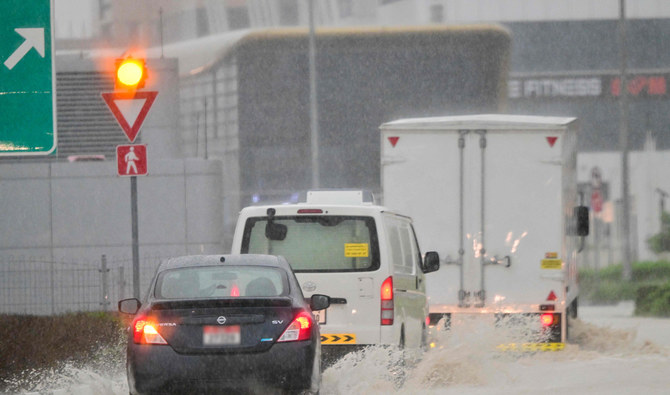
- Flights were canceled in Dubai while schools were shut in United Arab Emirates and Bahrain
- Some inland areas of the desert country recorded more than 80 millimeters (3.2 inches) of rain
DUBAI: Heavy rains lashed the United Arab Emirates on Tuesday, flooding out portions of major highways and leaving vehicles abandoned on roadways across Dubai. Meanwhile, the death toll in separate heavy flooding in neighboring Oman rose to 18 with others still missing as the sultanate prepared for the storm.
The rains began overnight, leaving massive ponds on streets as whipping winds disrupted flights at Dubai International Airport, the world’s busiest for international travel and the home of the long-haul carrier Emirates.
Police and emergency personnel drove slowly through the flooded streets, their emergency lights flashing across the darkened morning. Lightning flashed across the sky, occasionally touching the tip of the Burj Khalifa, the world’s tallest building.
Schools across the UAE, a federation of seven sheikhdoms, largely shut ahead of the storm and government employees were largely working remotely if able. Many workers stayed home as well, though some ventured out, with the unfortunate stalling out their vehicles in deeper-than-expected water covering some roads.
Authorities sent tanker trucks out into the streets and highways to pump away the water.
Rain is unusual in the UAE, an arid, Arabian Peninsula nation, but occurs periodically during the cooler winter months. Many roads and other areas lack drainage given the lack of regular rainfall, causing flooding.
Initial estimates suggested over 30 millimeters (1 inch) of rain fell over the morning in Dubai, with as much as 128 mm (5 inches) of rain expected throughout the day.
Rain also fell in Bahrain, Qatar and Saudi Arabia.
In neighboring Oman, a sultanate that rests on the eastern edge of the Arabian Peninsula, at least 18 people had been killed in heavy rains in recent days, according to a statement Tuesday from the country’s National Committee for Emergency Management. That includes some 10 schoolchildren swept away in a vehicle with an adult, which saw condolences come into the country from rulers across the region.
Education in crisis: Gaza’s schools destroyed amid Israel’s war
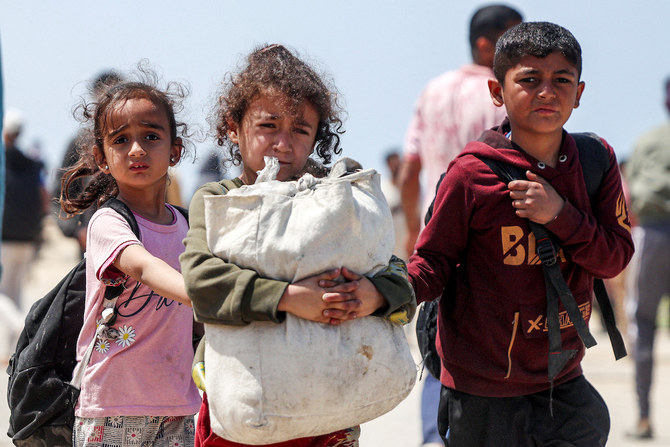
- March report found approximately 87.7 percent of school facilities in Gaza had been either damaged or destroyed
LONDON: The long-term potential of and opportunities for children in Gaza is being severely threatened by the Israel-Hamas war, charity Save the Children has said.
All schools in Gaza have been closed since Israel launched its offensive in October, impacting 625,000 students. Meanwhile, relentless airstrikes have destroyed every university in the Strip.
Ahmad, a displaced father in Rafah, shared his despair for the future of his three children. “I can’t see a life for them anymore,” he said.
For Ahmad and countless other parents, the primary goal is keeping their children alive.
But, said Save the Children, many are aware that even if they survive the immediate threats of bombings and starvation, their education and development will be hugely impacted.
A report published in March found approximately 87.7 percent of school facilities in Gaza had been either damaged or destroyed. A total of 212 school buildings received direct hits, while a further 282 sustained various degrees of damage.
Access challenges, especially in the North Gaza governorates, has led the Education Cluster to conduct a satellite-derived damage assessment to confirm the state of educational facilities.
According to International Humanitarian Law, schools generally should not be targeted and such attacks represent severe violations against children. Prolonged absence from school is considered likely to cause not just a break in learning but regression in progress, according to Save the Children.
Past experiences indicate that children are less likely to return to school the longer they are away from it, jeopardizing their prospects for economic well-being and mental and physical health. They also face increased risk of violence and abuse.
“Children have no escape from the reality of war, no stable routine, no opportunity to learn or play – and for many, no family. These are essential protective factors that children need to mitigate against the risk of lasting mental harm,” said a statement from Save the Children.
Children in Gaza have consistently expressed a strong desire to return to school, citing it as one of their top priorities for restoring a sense of normalcy and continuing their educational and social development.
“A few days ago, one of my children told me, ‘I want to eat healthy food. I really want to go to school and live my old, normal life. And I want to play’,” said Maher, a father in Gaza.
Save the Children has called for an immediate and comprehensive ceasefire and an end to the siege on Gaza.
It has urged the reopening of all crossings to ensure the flow of both commercial and humanitarian goods, as well as demanding that the Israeli government ceases unlawful attacks on educational facilities and fully implements the Safe Schools Declaration.
Denmark to close its Iraq embassy
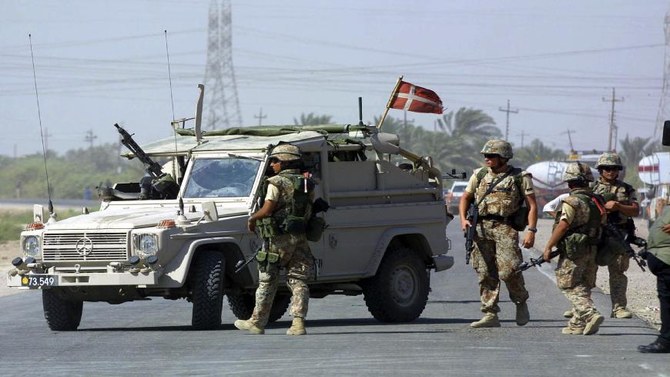
OSLO: Denmark will close down its embassy in Iraq on May 31, the Danish foreign ministry said in a statement on Tuesday.
The diplomatic mission in Baghdad was formally opened in 2020 to support the Danish command over and contribution to the NATO Mission Iraq (NMI).
The majority of the Danish military contribution has since been withdrawn.
Egypt, UN coordinator stress need for smooth aid delivery to Gaza
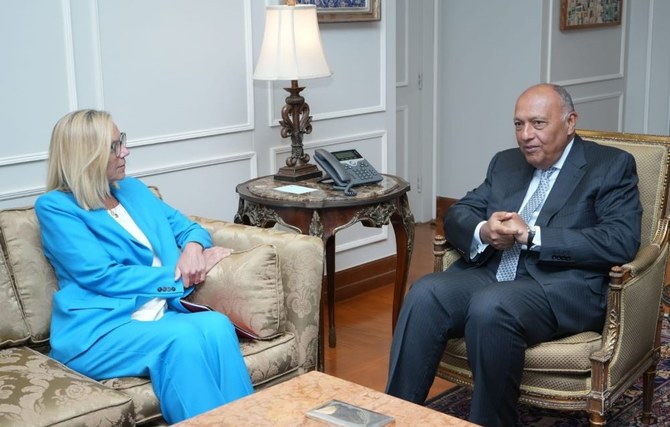
- Sameh Shoukry and Sigrid Kaag discussed the various facets of the humanitarian crisis in the besieged territory
- Kaag said she appreciated the pivotal role played by Egypt in containing the humanitarian repercussions of the crisis
CAIRO: Egypt’s Foreign Minister Sameh Shoukry and the UN’s coordinator for the Gaza Strip Sigrid Kaag on Tuesday discussed the various facets of the humanitarian crisis in the besieged territory, the volume and quality of aid entering it and the priorities regarding the type of aid.
The meeting took place at the Foreign Ministry’s headquarters in Cairo where the two sides reviewed the ongoing endeavors with various parties to expedite the launch of the UN mechanism as soon as possible.
They affirmed the inevitability of intensifying the volume of aid to meet the needs of the Palestinian people as well as providing the necessary protection for international relief personnel present in the Strip.
Shoukry reaffirmed the legal and humanitarian responsibility incumbent upon international parties to ensure the implementation of the provisions of Security Council Resolution 2720 and all other UN resolutions relevant to the situation in Gaza.
He stressed the necessity of dealing seriously and urgently with the humanitarian crisis in Gaza by reaching an immediate and permanent ceasefire, as well as sustaining aid access in a full, safe and intensive manner to all areas, the removal of impediments imposed by Israel in this regard and the opening of all land crossings to increase the flow of aid.
Kaag affirmed her keenness to continue coordination and consultation with Egypt to carry out her duties. She said she appreciated the pivotal role played by Egypt in containing the humanitarian repercussions of the crisis as well as the existing cooperation between the Egyptian Red Crescent, Egyptian civil society organizations and UN relief agencies to deliver aid.




